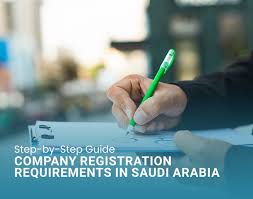Starting a business in Riyadh, Saudi Arabia, offers a wealth of opportunities, particularly with the government’s push for economic diversification under Vision 2030. Whether you’re an entrepreneur looking to expand into the Middle East or a local business owner aiming to formalize your operations, registering your business in Riyadh is a critical first step. One of the key components of business registration is getting your business listed properly. This article will guide you through the steps for registering your business and getting listed on official platforms in Riyadh, Saudi Arabia.
1. Understanding the Importance of Business Listings in Riyadh
A business listing is an official registration of your company in the appropriate databases and directories that the Saudi government maintains. Having your business properly listed ensures that it is legally recognized and compliant with local regulations, which is essential for operating in Riyadh.
In Saudi Arabia, business listings are essential for several reasons:
- Legality and Compliance: Official business listings are required for businesses to operate legally in Riyadh. Without registration, your business may face fines, closure, or legal action.
- Access to Opportunities: Being listed on government or business directories increases visibility and makes it easier to access incentives, funding opportunities, and partnerships.
- Building Trust: A proper business listing enhances your credibility with customers, suppliers, and investors.
The process of getting your business listed in Riyadh is relatively straightforward, but understanding the steps involved can save you time and ensure you follow the proper procedures.
2. Choose Your Business Structure
The first step in registering a business in Riyadh is to choose the right business structure. The type of business you form will affect your tax obligations, liability, and reporting requirements. Common business structures include:
- Sole Proprietorship: Owned and run by a single individual, this is a simple structure but comes with personal liability for debts and obligations.
- Limited Liability Company (LLC): An LLC is the most common business structure for small to medium-sized businesses. This structure limits the owners’ personal liability and offers more flexibility in operations.
- Joint Stock Company (JSC): This is suitable for larger businesses that plan to raise capital by offering shares to the public.
- Branch of a Foreign Company: If you’re an international business, you can establish a branch in Riyadh, though there are specific requirements and limitations for foreign ownership.
Choosing the right business structure is essential, as it impacts everything from the amount of control you have to your company’s liability and taxation requirements. For most new businesses in Riyadh, an LLC is the most practical choice.
3. Registering with the Ministry of Commerce and Investment (MOCI)
Once you’ve decided on your business structure, the next step is to register with the Ministry of Commerce and Investment (MOCI). The MOCI is the primary government authority overseeing business registration in Saudi Arabia. To start your registration process, you will need to:
- Prepare Required Documents: These may include your passport (for foreign investors), proof of residency, a copy of your business plan, and your chosen business name.
- Choose a Unique Business Name: Your business name must be unique and follow specific naming rules. The name should reflect the type of business you’re engaged in and should not infringe on the trademarks of other companies.
- Submit the Application: You can apply online through the MOCI’s website, or you can submit the paperwork in person. The application will ask for details about your company, the owners, the business structure, and the nature of your business.
Once submitted, the MOCI will process your application and issue your Commercial Registration (CR) certificate. This certificate is your official business license, and it’s the first step in getting your business listed in the government’s business database.
4. Obtain Additional Licenses and Permits
After obtaining your CR certificate, your business may require additional licenses or permits depending on your business activity. For instance:
- Municipal License: You’ll need this if you’re running a physical location in Riyadh. The license is issued by the local municipality and ensures that your business location complies with zoning and safety regulations.
- Sector-Specific Licenses: Businesses in certain sectors, such as food service, healthcare, and education, require specific permits in addition to the general commercial registration.
Ensure that your business complies with all local laws and industry regulations before opening your doors to the public. These licenses are often required before you can begin operations or even rent a commercial space.
5. Register for Taxes and Social Insurance
Saudi Arabia has a modern tax system, and registering for taxes is a critical part of the business registration process. There are a few key registrations to consider:
- VAT Registration: Saudi Arabia has a 15% Value Added Tax (VAT) that applies to most goods and services. Businesses with a turnover above a certain threshold (currently SAR 375,000 annually) must register for VAT with the General Authority of Zakat and Tax (GAZT).
- Zakat: Zakat is an obligatory tax for Muslim businesses in Saudi Arabia. Non-Muslim businesses may be exempt, but they should consult local tax advisors for more information.
- Social Insurance: As an employer, you must register with the General Organization for Social Insurance (GOSI) to provide social security benefits for your employees.
Registering for taxes and social insurance is essential to comply with Saudi laws and avoid penalties.
6. Open a Saudi Business Bank Account
To manage the financial aspects of your business, you’ll need to open a local business bank account in Riyadh. The process is relatively straightforward but requires certain documents:
- CR certificate from the MOCI.
- Investment license (if applicable for foreign investors).
- Proof of address in Saudi Arabia.
- Personal identification (passport or national ID for Saudis).
The bank will offer you a range of services, including local and international transfers, business loans, and payment processing services. Opening a business account is crucial for operationalizing your business and paying taxes or wages.
7. List Your Business in Local Directories and Online Platforms
Once your business is officially registered and operational, it’s time to ensure your company is visible. Listing your business in official and third-party directories can help increase visibility and attract customers. Key places to list your business include:
- Saudi Business Directory: The government has several online platforms where businesses can list their information. Registering your business on these platforms makes it visible to potential customers and partners.
- Chamber of Commerce: Being a member of the local Chamber of Commerce in Riyadh can provide valuable networking opportunities and further credibility for your business.
- Online Business Directories: Websites like Yelp, Google My Business, and Yellow Pages Saudi Arabia can also increase your business’s visibility.
Online listings improve your chances of being discovered by customers looking for your products or services. Additionally, being listed in these official directories can help enhance your business reputation.
8. Comply with Saudization Regulations
Saudization is a government initiative aimed at reducing unemployment among Saudi nationals by requiring businesses to hire a certain percentage of Saudi employees. As part of the registration process, you will need to comply with Saudization regulations and hire local talent when applicable. Failing to meet these requirements could result in fines or penalties.
Conclusion
Registering your business in Riyadh, Saudi Arabia, involves several steps that ensure legal compliance and open the door to countless opportunities. From selecting your business structure to obtaining the necessary licenses, registering for taxes, and listing your company in local directories, each step is vital for your success.
The business environment in Riyadh is rapidly growing, with ample opportunities for both local entrepreneurs and foreign investors. By following these steps and ensuring proper business registration and listing, you’ll be well on your way to establishing a successful enterprise in one of the Middle East’s most dynamic cities.



